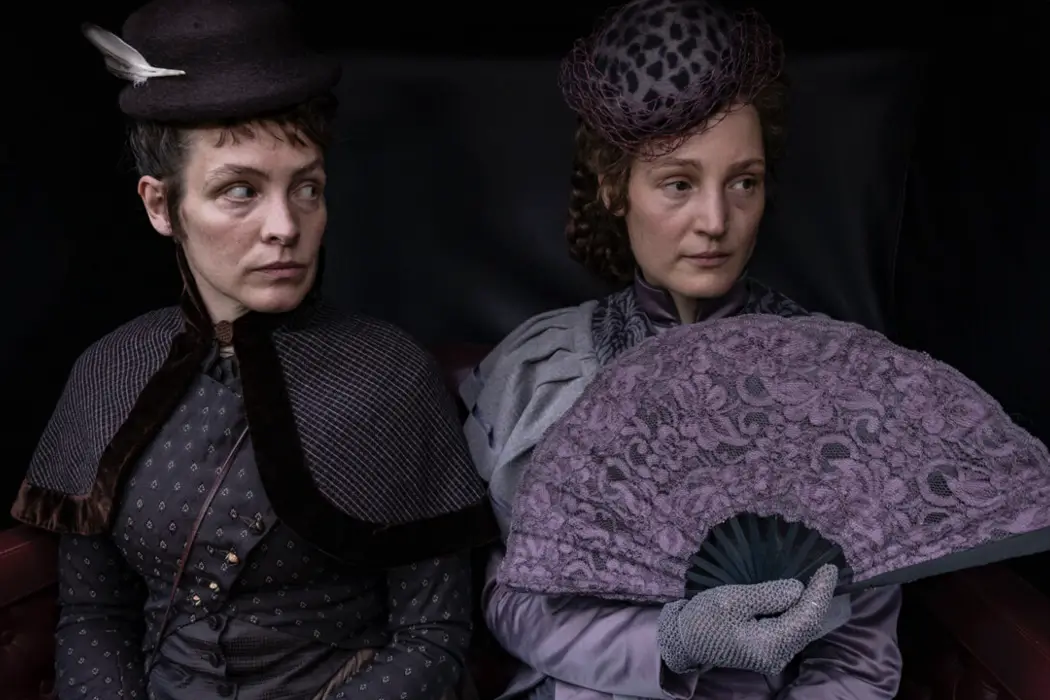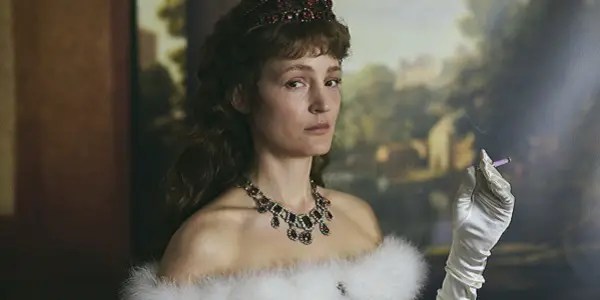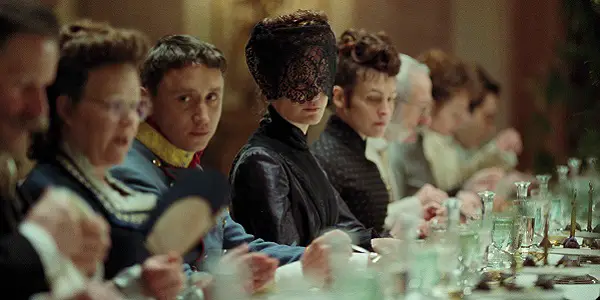New York Film Festival 2022: CORSAGE

Lee Jutton has directed short films starring a killer toaster,…
The sad life of Empress Elisabeth of Austria — her unhappy marriage to Emperor Franz Joseph I, the premature deaths of her children, her unhealthy obsession with maintaining her legendary beauty, and her death by assassination at the age of 60 — has been depicted in films numerous times over the years. Quite possibly the most famous of these depictions is the Sissi trilogy starring Romy Schneider, an idealized portrayal of the empress as a young woman and devoted mother that is shown on TV every Christmas in Austria, Germany, France, and the Netherlands. But if the Sissi trilogy feels like a series of sentimental pop ballads, writer-director Marie Kreutzer’s new cinematic depiction of the life of the Empress, Corsage, is a punk rock rebel yell: angry, energetic, and intensely enjoyable.
Tightly Wound
Starring the remarkable Vicky Krieps in her second great performance of the year (following Mathieu Amalric’s Hold Me Tight), Corsage revolves around the year of the Empress’ fortieth birthday. It’s a year of reckoning for Elisabeth. She’s still starving herself to maintain her tiny waist and struggling to preserve her renowned beauty — including a famous mane of rich auburn curls that, when not set in a much-imitated crown of braids upon her head, falls all the way to her ankles. But no matter how much she tightens her corset (which is also referred to in this film as a corsage), it’s clear that in the battle against the onslaught of time, even an empress cannot reign superior.

Unfortunately, without her beauty, Elisabeth’s life is essentially rendered meaningless. Despite her expressed desire to play more of a role in the running of the empire, the Emperor (Florian Teichtmeister) sees her as little more than a beautiful accessory to wear on his arm, telling her, “All you need to do is be appealing — that’s why I chose you, that’s why you’re here.” She’s intelligent and curious about everything from foreign policy to mental health to new technologies, but her strictly performative role gives her little chance to explore these interests without breaking some established protocol. Indeed, Elisabeth’s corset is a metaphor for her entire life: as it becomes more tightly laced, so does her position as Empress involves increasingly suffocating restraint. What else is there to do but openly rebel?
God Save The Queen
A feast for the eyes and mind, Corsage is rich with period details — Monika Buttinger’s costumes are a particular delight — yet has a decidedly modern sensibility in how it approaches Elisabeth’s story. The film depicts the Empress as a flawed but fascinating woman embarking on a journey that takes her across Europe and through her past as she seeks to take control (or at least, as much control as possible) over her future. Instead of staying beholden to biopic conventions and portraying events exactly as they occurred, Kreutzer allows Elisabeth to do things like flip the bird and cut her hair that, while likely not historically accurate, feel true to the spirit of the story. The film mixes fact and fantasy to delve deep into Elisabeth’s insecurities and desires, many of which — including the impossibly high standards of beauty and the pressure to be a perfect wife and mother — still plague women today.
Elisabeth is not always a likable figure. Indeed, she’s as selfish and narcissistic as one would expect from someone raised to rule, not only forbidding her most loyal lady-in-waiting from leaving her to get married but also forcing her to starve herself so she can masquerade as the Empress for public appearances while Elisabeth chows down on the cream cake. Yet it’s also clear that the world she has grown up in — indeed, the only world she has ever known — helped to make her this way.

When you’ve been treated as an icon for almost your entire life, it’s hard to break free and live life as a real woman, yet Krieps’ magnificent, multifaceted performance renders Elisabeth’s struggle to do so with great energy and emotion — and most importantly, a sly sense of humor. Krieps is a master at portraying complicated women with all of the consideration that they deserve, and Elisabeth is no different. Even if you do not have sympathy for her plight, it’s near-impossible to not have empathy for her.
While Krieps’ performance might be the sparkling centerpiece of Corsage, the film is impeccably crafted from top to bottom. There are so many little moments that linger in the mind long after the film is over, from the way Elisabeth’s (illicit) cigarettes and the candies she hands out to injured soldiers are in her trademark shade of purple, to the scene with the doctor who encourages her to try a new drug called heroin when she needs to relax, the morning Elisabeth’s cousin, King Ludwig II of Bavaria, smiles at her with a ghastly grin before he puts his false teeth in. And while the soundtrack’s use of anachronistic music in many scenes may be a note of contention for some, I felt that its contrast with the stiff, official anthems that greet Elisabeth when she makes a public appearance only further highlighted the sharp difference between the public and private spheres of her life: the empress who must serve, and the woman who must live.
Conclusion:
Corsage builds to an ending that differs greatly from the historical reality but strangely feels much more deserved. It’s a fitting finale to what is one of the most surprising films of the year.
What do you think? Are you familiar with the story of Empress Elisabeth of Austria? Share your thoughts in the comments below.
Corsage is screening as part of the Main Slate at the 2022 New York Film Festival. It opens in theaters in the U.S. on December 23, 2022.
Watch Corsage
Does content like this matter to you?
Become a Member and support film journalism. Unlock access to all of Film Inquiry`s great articles. Join a community of like-minded readers who are passionate about cinema - get access to our private members Network, give back to independent filmmakers, and more.
Lee Jutton has directed short films starring a killer toaster, a killer Christmas tree, and a not-killer leopard. Her writing has appeared in publications such as Film School Rejects, Bitch: A Feminist Response to Pop Culture, Bitch Flicks, TV Fanatic, and Just Press Play. When not watching, making, or writing about films, she can usually be found on Twitter obsessing over soccer, BTS, and her cat.













